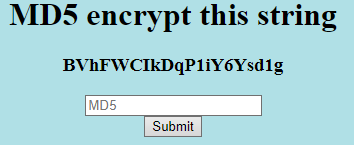Emdee Five For Life - Hack The Box Challenge
We start the web instance and when we access we will see the following interface:
The string displayed by the page changes every time we visit it. Also, when entering the MD5 hash of the string “by hand” we will get a message saying “Too slow!”
From this message we can deduce that the challenge consists of encrypting the string and sending it as quickly as possible.
This is a really easy challenge, and there are a few ways to do it, I’ll show u two, the first using curl and some bash commands via the command line, and the second using a python script (several ways to do it)
Using curl and the command line:
- curl: It allows us to interact with the page via HTTP requirements (GET to obtain the content and POST to send the response).
- grep: It allows us to extract the useful content from the content of the web page, that is, the string to encode.
- tr: Very important to obtain the flag, it helps us to eliminate unwanted characters from some input/output.
- md5sum: With this command we carry out the encryption of the string.
With these commands, we execute the following line in the console to obtain the flag:
curl -s http://178.62.14.240:30096/ -X POST -d hash=$(curl -s http://209.97.187.224:31840/ -c cookie.txt | grep -oP "(?<=h3 align='center'>).*(?=</)" | tr -d "\n" | md5sum | tr -d -) -b cookies.txt
-
We have to replace this line
http://178.62.14.240:30096/(in both cases) with the line that hack the box gives us when starting an instance -
The curl command used to send the hash (POST request) is input the output of another command using the syntax curl
-X POST -d hash = $ (curl ...). On the other hand, the -c and -b flags are used to save / read a file with the session cookies. -
The argument -oP “(? <= H3 align = ‘center’>). * (? = /)” Of the grep command is to get the string that is between the two strings that are in parentheses.
-
Linux commands contain a line break (
\n) at the end of their output, so that the output and the next input are on separate lines. If we do not use tr-d “n” we will be passing the string with the line break included to the md5sum command, resulting in an erroneous hash. -
In addition to the above, when the output of another command is passed to md5sum using a pipe, it returns a dash (-) at the end of the hash, so it is necessary to use tr -d - to remove it and send the input.
It is worth mentioning that this command does not work 100% of the time (apparently it requires a good internet connection).
Using a Python script
The procedure is the same, but in this case we are more likely to obtain the flag.
There are two scripts, one if you want to modify the url in the code and the other if you want to pass the url as a parameter.
#!/usr/bin/env python3
import requests
import hashlib
import sys
URL = ""
if (len(sys.argv)==2):
URL=sys.argv[1]#taking arg as the url/target
else:
print("-------------------------- ERROR FOUND -----------------------")
print("Usage: "+str(sys.argv[0])+"http://url:port") # error msg
exit()
# Get PHPSESSID
def get_cookie():
response = requests.get(URL)
headers = dict(response.headers)
return headers["Set-Cookie"]
# Get value from response string
def get_value(data, type=False):
tagsrt = ""
tagend = ""
if type:
tagsrt = "<p align='center'>"
tagend = "</p>"
else:
tagsrt = "<h3 align='center'>"
tagend = "</h3>"
return data[data.find(tagsrt)+len(tagsrt):data.rfind(tagend)]
# Main function
def main():
print("[*] Getting cookie...")
cookie = get_cookie()
print("[*] Asking for data to hash...")
data = requests.get(URL, headers={'cookie': cookie}).text
value = get_value(data)
md5 = hashlib.md5(value.encode()).hexdigest()
print("[*] Sending hash...")
data = requests.post(URL, data={'hash': md5}, headers={
'cookie': cookie}).text
flag = get_value(data, True)
print("[*] Retreiving data...")
print("Flag: " + flag)
if __name__ == '__main__':
main()
Output:
[*] Getting cookie...
[*] Asking for data to hash...
[*] Sending hash...
[*] Retreiving data...
Flag: HTB{XXXXXXXXXXXXXXX}
Bye

 Hack The Box
Hack The Box
 Try Hack Me
Try Hack Me

